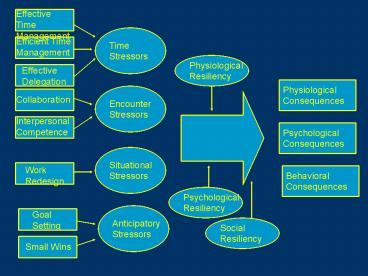Time Management Techniques - PowerPoint PPT Presentation
1 / 17
Title:
Time Management Techniques
Description:
Do important things one at a time but trivial things simultaneously ... Don't shuffle paper - do something with it. Keep the workplace clean. Delegate - empower ... – PowerPoint PPT presentation
Number of Views:28
Avg rating:3.0/5.0
Title: Time Management Techniques
1
Effective Time Management
Time Stressors
Efficient Time Management
Physiological Resiliency
Effective Delegation
Physiological Consequences
Encounter Stressors
Collaboration
Interpersonal Competence
Psychological Consequences
Situational Stressors
Work Redesign
Behavioral Consequences
Psychological Resiliency
Anticipatory Stressors
Goal Setting
Social Resiliency
Small Wins
2
Time Stressors
- Work overload
- Lack of control
3
Eliminating Time Stressors
- Efficient time management
- Effective time management
- Effective delegation/empowerment
4
Efficient Time Management Techniques
- Read selectively
- Make a to do list
- Keep things in their place
- Prioritize
- Do important things one at a time but trivial
things simultaneously - List small discretionary tasks
- Divide up large tasks
- Determine the critical 20 of your tasks
(Paretos law) - Do important tasks when you are high energy
- Reserve some quiet time - out of the line of fire
- Dont procrastinate
5
Efficient Time Management Techniques
- Keep track of your time
- Set deadlines
- Dont waste waiting time
- Bundle busy work
- Get at least one thing done every day
- Schedule some personal time daily
- Dont dwell on something constantly
6
Efficient Time Management Techniques
- Have long-term objectives
- Continuously improve your time management
7
Efficient Time Management Techniques for Managers
- Hold routine meetings at the end of the day
- Hold short meetings standing up
- Set a time limit for meetings
- Cancel meetings when not needed
- Have agendas and follow them
- Start meetings on time
- Prepare minutes promptly and follow up
- Develop subordinates
- Meet visitors in the doorway
- Go to others offices
- Dont overschedule the day
8
Efficient Time Management Techniques for Managers
- Have a hiding place
- Dont shuffle paper - do something with it
- Keep the workplace clean
- Delegate - empower
- Give others credit for success
- Buffer telephone calls
9
Effective Time Management
URGENCY
High
Low
Developmental Opportunities Innovating Planning
Crises Customer Complaints
High
IMPORTANCE
Mail Ringing telephone Unscheduled interruptions
Escapes Routines Arguments
Low
10
Encounter Stressors
- Role conflicts
- Issue conflicts
- Interaction conflicts
11
Eliminating Encounter Stressors
- Collaboration and clan building
- Emotional bank accounts Deposits are being kind,
courteous, honest, and consistent. Withdrawals
are not keeping promises, not listening, not
clarifying expectations, not allowing choice. - Base relationships with others on mutual trust,
respect, honesty, and kindness.
12
Eliminating Encounter Stressors
- Interpersonal competence
- Emotional Intelligence (EQ)
- Knowing ones emotions
- Emotional self-control
- Self-motivation delay gratification
- Empathy
- Social competence
13
Situational Stressors
- Unfavorable working conditions
- Life events
14
Eliminating situational stressors
- Job redesign
- Combine tasks
- Form identifiable work units
- Increase autonomy/empower
- Greater feedback
15
Anticipatory stressors
- Goal setting
- Small wins strategy
16
Developing Resiliency
- Physiological resiliency
- cardiovascular conditioning
- proper diet
- Psychological resiliency
- life balance
- hardiness
- Type A / Type B
- small-wins strategy
- deep-relaxation
17
Developing Resiliency
- Social resiliency
- supportive social relations
- mentors
- teamwork

